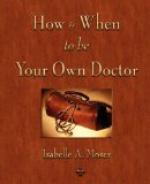The Human Comedy
I know most of my readers have been heavily indoctrinated about food and think they already know the truth about dietetics. I also know that so much information (and misinformation) is coming out about diet that most of my readers are massively confused about the subject. These are two powerful reasons many readers will look with disbelief at what this chapter has to say and take no action on my data, even to prove me wrong.
Let me warn you. There is a deep-seated human tendency to put off taking responsibilities, beautifully demonstrated by this old joke.
A 14 year old boy was discovered masturbating by his father, who said, “son, you shouldn’t do that! If you keep it up you’ll eventually go blind!”
“But father,” came the boy’s quick reply. “It feels good. How about if I don’t quit until I need to wear glasses?”
The Organic Versus Chemical Feud
Now, regrettably, and at great personal risk to my reputation, I must try to puncture the very favorite belief of food religionists, the doctrine that organically grown food is as nutritious as food can possibly be, Like Woody Allen’s brown-rice-eating friends, people think if you eat Organic foods, you will inevitably live a very long time and be very healthy. Actually, the Organic vs. chemical feud is in many ways false. Many (not all) samples of organically grown food are as low or lower in nutrition as foods raised with chemical fertilizers. Conversely, wisely using chemical fertilizers (not pesticides) can greatly increase the nutritional value of food. Judiciously used Organic fertilizing substances can also do that as well or better. And in either case, using chemical fertilizers or so-called organic fertilizers, to maximize nutrition the humus content of the soil must be maintained. But, raising soil organic matter levels too high can result in a massive reduction in the nutritional content of the food being grown—a very frequent mistake on the part of Organic devotees. In other words, growing nutrition is a science, and is not a matter of religion.
The food I fed to my daughter in childhood, though Organic according to Rodale and the certification bureaucrats, though providing this organic food to my family and clients gave me a feeling of self-righteousness, was not grown with an understanding of the nutritional consequences of electing to use one particular Organic fertilizing substance over another. So we and a lot of regional Organic market gardeners near us that we bought from, were raising food that was far from ideally nutritious. At least though, our food was free of pesticide residues.




